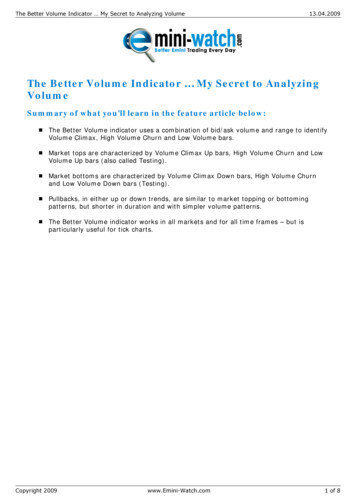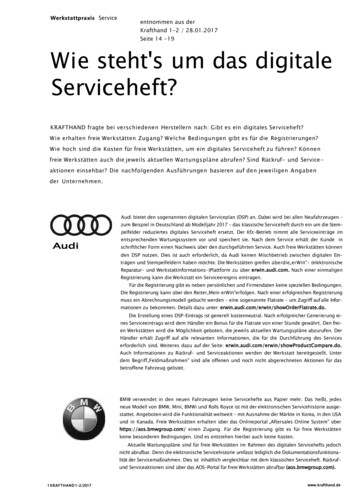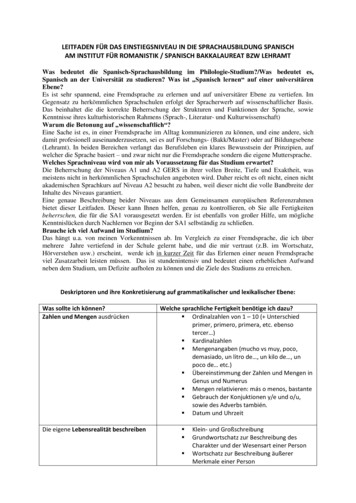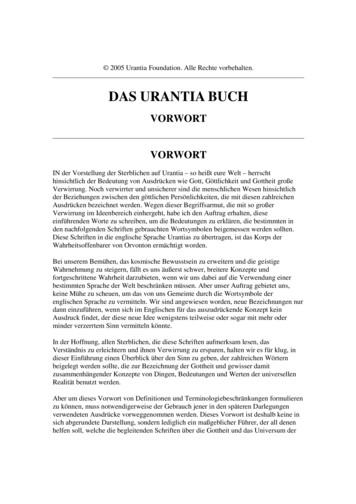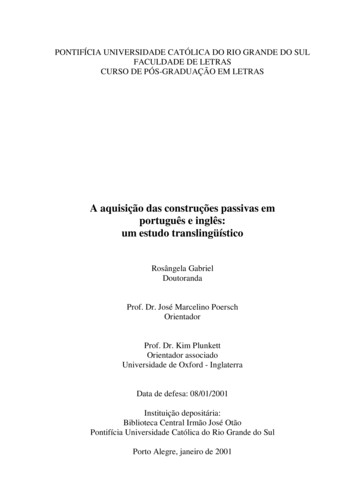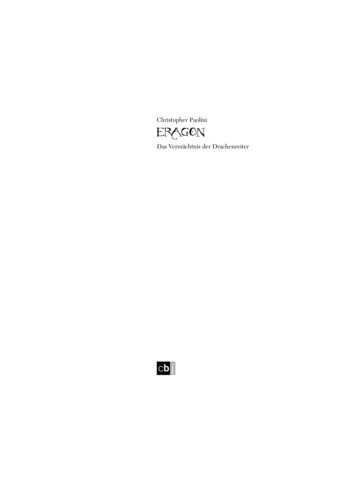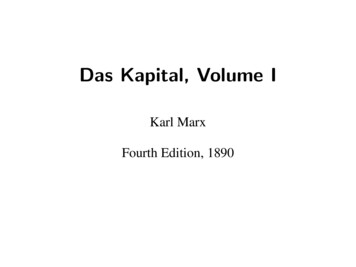
Transcription
Das Kapital, Volume IKarl MarxFourth Edition, 1890
ContentsForeword 2002xiiPreface to the First Edition of ‘Capital’xvPostface to the Second EditionxxxPreface to the French EditionlxiPostface to the French Editionlxivi
ContentsPreface to the Third EditionlxviiPreface to the English EditionlxxviPreface to the Fourth EditionxciiI.Commodities and Money1. The1.1.1.2.1.3.CommodityUse-Value and Value . . . . . . . . . . . . . . . . .Double Character of Labor . . . . . . . . . . . . . .Form of Value . . . . . . . . . . . . . . . . . . . . .1.3.A. Simple, Isolated, or Accidental Form of Value1.3.B. The Total or Expanded Form of Value . . . .1.3.C. General Form of Value . . . . . . . . . . . .1.3.D. Money Form . . . . . . . . . . . . . . . . .1.4. Fetish-Like Character and its Secret . . . . . . . . .1.22244448100108125129
Contents2. Exchange Process3. Money or the Circulation of Commodities3.1. Measure of Value . . . . . . . . . . . . . . .3.2. Means of Circulation . . . . . . . . . . . . .3.2.A. The Metamorphosis of Commodities3.2.B. The Flow of Money . . . . . . . . . .3.2.C. Coins and Symbols of Value . . . . .3.3. Money . . . . . . . . . . . . . . . . . . . . .3.3.A. Hoarding . . . . . . . . . . . . . . .3.3.B. Means of Payment . . . . . . . . . .3.3.C. World Money . . . . . . . . . . . . .170.II. The Transformation of Money into Capital4. General Formula of Capital.197197225225264295310311324344350351
Contents5. Contradictions of M–C–M3816. Sale and Purchase of Labor-Power415III. The Production of Absolute Surplus-Value4477. Labor Process and Valorization Process4487.1. Labor Process . . . . . . . . . . . . . . . . . . . . . . . . . . . . . . . . . 4487.2. Valorization Process . . . . . . . . . . . . . . . . . . . . . . . . . . . . . . 4788. Constant Capital and Variable Capital9. The9.1.9.2.9.3.9.4.ivRate of Surplus-ValueThe Degree of Exploitation of Labor-PowerRepresentation of Value of Product . . . . .Senior’s ‘Last Hour’ . . . . . . . . . . . .The Surplus Product . . . . . . . . . . . .520.559559586598611
Contents10.The Working-Day10.1. Limits of Working-Day . . . . . . . . . . . . . . . . . . . . . .10.2. Manufacturer and Boyard . . . . . . . . . . . . . . . . . . . . .10.3. Branches With No Legal Bounds to Exploitation . . . . . . . . .10.4. Day and Night Work. Relais System . . . . . . . . . . . . . . .10.5. Compulsory Laws for Extension of Working-Day . . . . . . . .10.6. Limitation by Law of the Working Time. Factory Acts 1833–6410.7. Effect of English Factory Acts on Other Countries . . . . . . . .11.Rate and Mass of Surplus-ValueIV. The Production of Relative cept of Relative Surplus-Value84813.Co-Operation880v
Contents14.Division of Labor and Manufacture14.1. Two-Fold Origin of Manufacture . . . . . . . . .14.2. The Specialized Worker and His Tools . . . . . .14.3. Heterogeneous and Organic Manufacture . . . .14.4. Division of Labor in Manufacture and in Society14.5. The Capitalist Character of Manufacture . . . . .92692693694697299815.Machinery and Modern Industry15.1. The Development of Machinery . . . . . . . . . . . .15.2. The Value Transferred by the Machinery to the Product15.3. Proximate Effects of Machinery on the Worker . . . .15.3.A. Employment of Women and Children . . . . .15.3.B. Prolongation of the Working-Day. . . . . . . .15.3.C. Intensification of Labor . . . . . . . . . . . . .15.4. The Factory . . . . . . . . . . . . . . . . . . . . . . .15.5. Strife between Worker and Machine . . . . . . . . . .15.6. The Theory of Compensation . . . . . . . . . . . . . .1024102410731095109611201137116711851216.
Contents15.7. Repulsion and Attraction of Laborers. Crises of the Cotton Industry . . .15.8. Impact of Large-Scale Industry on Manufacture, Handicrafts etc. . . . . .15.8.A. Supersession of Co-operation Based on Handicraft . . . . . . . .15.8.B. Reaction of Factory on Manufacture and Domestic Industries . . .15.8.C. Modern Manufacture . . . . . . . . . . . . . . . . . . . . . . . .15.8.D. Modern Domestic Industry . . . . . . . . . . . . . . . . . . . . .15.8.E. Transition to Modern Industry. Acceleration through Factory Acts15.9. Sanitary and Educational Clauses. Extension of Factory Acts in England .15.10.Modern Industry and Agriculture . . . . . . . . . . . . . . . . . . . . . .124612811281128612921302131813481422V. The Production of Absolute and of Relative Surplus-Value142916.Absolute and Relative Surplus-Value143017.Changes in Price of Labor-Power and Surplus-Value1466I.Length and Intensity Constant, Productivity Variable . . . . . . . . . . . . 1470
ContentsII.III.IV.Length and Productivity Constant, Intensity Variable . . . . . . . . . . . . 1485Productivity and Intensity Constant, Length Variable . . . . . . . . . . . . 1490Simultaneous Variations . . . . . . . . . . . . . . . . . . . . . . . . . . . 149618.Formulae for Rate of Surplus-ValueVI. Wages1506151719.From Value of Labor-Power to Wage151820.Time Wages154321.Piece Wages156622.National Differences of Wages1588viii
ContentsVII.The Accumulation Process of Capital160623.Simple Reproduction161324.Transformation of Surplus-Value into Capital1.Expanded Reproduction. Inversion of the Property Laws2.Erroneous Conception . . . . . . . . . . . . . . . . . .3.Division into Capital and Revenue. Abstinence Theory .4.Circumstances which Determine Extent of Accumulation5.The So-Called Labor Fund . . . . . . . . . . . . . . . .1655. 1655. 1688. 1698. 1721. 175025.General Law of Capitalist Accumulation1.Accumulation Under Equal Composition of Capital2.Relative Diminution of Variable Capital . . . . . .3.Industrial Reserve Army . . . . . . . . . . . . . .4.Forms of Existence of Surplus Population . . . . .5.Illustrations of the General Law . . . . . . . . . .5.A. England 1846–1866 . . . . . . . . . . . .1758175817851815185618811881ix
Contents5.B.5.C.5.D.5.E.5.F.Poorly Paid Strata . . . . . . . . . .The Nomad Population . . . . . . . .Effect of Crises on Best Paid WorkersThe British Agricultural Proletariat .Ireland . . . . . . . . . . . . . . . .VIII.The So-Called Original Accumulation.18971927194119582023206526.The Secret of Original Accumulation206627.Expropriation of Agricultural Population207928.Bloody Legislation. Forcing Down of Wages212029.Genesis of the Capitalist Farmer214630.Reaction of Agriculture on Industry2151x
Contents31.Genesis of the Industrial Capitalist216432.Historical Tendency of Capitalist Accumulation220033.The Modern Theory of Colonization2211Footnotes2243
Foreword 2002When I started writing the Annotations to Karl Marx’s ‘Capital’, which are available athttp://www.econ.utah.edu/ehrbar/akmc.htm. it became quickly apparent that a newtranslation was necessary. This here is the translation developed while writing the Annotations, typeset side-by-side with the German original from the 4th edition as published inMEW 23.It is by far not yet a final product, it is under continuous revision. Most tables are simplyomitted in the present version. The literature references are in part given as hyperlinks to acomprehensive bibliography at the end, and in part in the text as in Marx’s original. My planis to eventually make them all hyperlinks.I first either downloaded the English translation from the Marxists Internet Archive orxii
scanned in the English translation from the Vintage edition, and then I made alterations tothese translations as they seemed necessary while working myself through the text. As a consequence, some passages are changed greatly, while others, which I have not yet processedin depth for my Annotations, are simply the version that I downloaded or scanned in. Allthis means that the copyright situation for this work at the present incomplete stage is uncertain. Eventually the plan is to have all parts of the translation thoroughly revised, thereforewhen the project is completed I think it will not violate any copyrights. The page numbersgiven at the beginning of each paragraph, and the footnote numbers refer to the Vintage,resp. Penguin edition [Mar76] on the English side, and to the German Marx Engels Werke[Mar62] on the German side. The German side of the text also uses the translations of thefootnotes from Marx-Engels Werke, and I thank Karl Dietz-Verlag in Berlin for permissionto do so.The LATEX source code used to produce this document is freely available under the GNUPublic license. If you have ideas how to make this translation better, or if you notice typosetc., please email me.Hans G. EhrbarEconomics Departmentxiii
Foreword 2002University of Utah1645 Campus Center Drive, Rm. 308Salt Lake City UT 84112-9300USAehrbar@econ.utah.eduxiv
Preface to the First Edition of‘Capital’89:1 This work, whose first volume I nowsubmit to the public, forms the continuation of my book Zur Kritik der PolitischenOekonomie, published in 1859. The longpause between the first part and the continuation is due to an illness of many years’duration, which interrupted my work againand again.11:1 Das Werk, dessen ersten Band ichdem Publikum übergebe, bildet die Fortsetzung meiner 1859 veröffentlichten Schrift:Zur Kritik der Politischen Oekonomie“.”Die lange Pause zwischen Anfang und Fortsetzung ist einer langjährigen Krankheit geschuldet, die meine Arbeit wieder und wieder unterbrach.
Preface to the First Edition of ‘Capital’89:2 The substance of that earlier work issummarized in the first chapter of this volume. This is done not merely for the sakeof connectedness and completeness. Thepresentation is improved. As far as circumstances in any way permit, many points onlyhinted at in the earlier book are here workedout more fully, while, conversely, pointsworked out fully there are only touchedupon in this volume. The sections on thehistory of the theories of value and of moneyare now, of course, left out altogether. However, the reader of the earlier work will findnew sources relating to the history of thosetheories in the notes to the first chapter.11:2 Der Inhalt jener früheren Schriftist resümiert im ersten Kapitel dieses Bandes. Es geschah dies nicht nur des Zusammenhangs und der Vollständigkeit wegen. Die Darstellung ist verbessert. Soweit es der Sachverhalt irgendwie erlaubte,sind viele früher nur angedeuteten Punktehier weiter entwickelt, während umgekehrtdort ausführlich Entwickeltes hier nur angedeutet wird. Die Abschnitte über die Geschichte der Wert- und Geldtheorie fallenjetzt natürlich ganz weg. Jedoch findet derLeser der früheren Schrift in den Noten zumersten Kapitel neue Quellen zur Geschichtejener Theorie eröffnet.89:3/o Beginnings are always difficult inall sciences. The understanding of the first11:3/o Aller Anfang ist schwer, gilt injeder Wissenschaft. Das Verständnis desxvi
chapter, especially the section that containsthe analysis of commodities, will thereforepresent the greatest difficulty. I have popularized the passages concerning the substance of value and the magnitude of valueas much as possible.1ersten Kapitels, namentlich des Abschnitts,der die Analyse der Ware enthält, wird daherdie meiste Schwierigkeit machen. Was nunnäher die Analyse der Wertsubstanz und derWertgröße betrifft, so habe ich sie möglichstpopularisiert.1The value-form, whose fully developedshape is the money-form, is very simple andslight in content. Nevertheless, the humanmind has sought in vain for more than 2,000years to get to the bottom of it, while onthe other hand there has been at least anapproximation to a successful analysis offorms which are much richer in content andmore complex. Why? Because the completebody is easier to study than its cells.Die Wertform, deren fertige Gestalt dieGeldform, ist sehr inhaltslos und einfach.Dennoch hat der Menschengeist sie seitmehr als 2000 Jahren vergeblich zu ergründen gesucht, während andrerseits dieAnalyse viel inhaltsvollerer und komplizierterer Formen wenigstens annähernd gelang. Warum? Weil der ausgebildete Körperleichter zu studieren ist als die Körperzelle.Moreover, in the analysis of economicBei der Analyse der ökonomischen Formenxvii
Preface to the First Edition of ‘Capital’forms neither microscopes nor chemicalreagents are of assistance. The power ofabstraction must replace both.kann außerdem weder das Mikroskop dienen noch chemische Reagentien. Die Abstraktionskraft muß beide ersetzen.But for bourgeois society, the commodityform of the product of labor, or the valueform of the commodity, is the economiccell-form. To the uneducated observer, theanalysis of these forms seems to turn uponminutiae. It does in fact deal with minutiae,but so similarly does microscopic anatomy.Für die bürgerliche Gesellschaft ist aber dieWarenform des Arbeitsprodukts oder dieWertform der Ware die ökonomische Zellenform. Dem Ungebildeten scheint sich ihre Analyse in bloßen Spitzfindigkeiten herumzutreiben. Es handelt sich dabei in derTat um Spitzfindigkeiten, aber nur so, wie essich in der mikrologischen Anatomie darumhandelt.90:1 With the exception of the section onthe form of value, therefore, this volumecannot stand accused on the score of difficulty. I assume, of course, a reader who iswilling to learn something new and there-12:1 Mit Ausnahme des Abschnitts überdie Wertform wird man daher dies Buchnicht wegen Schwerverständlichkeit anklagen können. Ich unterstelle natürlich Leser, die etwas Neues lernen, also auch selbstxviii
fore to think for himself.denken wollen.90:2 The physicist observes natural processes either in situations where they appearin the clearest form with the least contamination by disturbing influences, or, wherever possible, he makes experiments under conditions which ensure that the process will occur in its pure state. What Ihave to examine in this work is the capitalist mode of production, and the relationsof production and forms of intercourse thatcorrespond to it. Until now, their locus classicus has been England. This is the reason why England is used as the main illustration of the theoretical developments Imake. If, however, the German reader pharisaically shrugs his shoulders at the condition12:2 Der Physiker beobachtet Naturprozesse entweder dort, wo sie in der prägnantesten Form und von störenden Einflüssenmindest getrübt erscheinen, oder, wo möglich, macht er Experimente unter Bedingungen, welche den reinen Vorgang des Prozesses sichern. Was ich in diesem Werk zuerforschen habe, ist die kapitalistische Produktionsweise und die ihr entsprechendenProduktions- und Verkehrsverhältnisse. Ihreklassische Stätte ist bis jetzt England. Diesder Grund, warum es zur Hauptillustration meiner theoretischen Entwicklung dient.Sollte jedoch der deutsche Leser pharisäischdie Achseln zucken über die Zustände derenglischen Industrie- und Ackerbauarbeiterxix
Preface to the First Edition of ‘Capital’of the English industrial and agriculturalworkers, or optimistically comforts himselfwith the thought that in Germany things arenot nearly so bad, I must plainly tell him:De te fabula narratur!oder sich optimistisch dabei beruhigen, daßin Deutschland die Sachen noch lange nichtso schlimm stehn, so muß ich ihm zurufen:De te fabula narratur!90:3/o Intrinsically, it is not a question ofthe higher or lower degree of developmentof the social antagonisms that spring fromthe natural laws of capitalist production. Itis a question of these laws themselves, ofthese tendencies winning their way throughand working themselves out with iron necessity. The country that is more developedindustrially only shows, to the less developed, the image of its own future.12:3 An und für sich handelt es sich nichtum den höheren oder niedrigeren Entwicklungsgrad der gesellschaftlichen Antagonismen, welche aus den Naturgesetzen der kapitalistischen Produktion entspringen. Eshandelt sich um diese Gesetze selbst, umdiese mit eherner Notwendigkeit wirkendenund sich durchsetzenden Tendenzen. Dasindustriell entwickeltere Land zeigt demminder entwickelten nur das Bild der eignen Zukunft.91:1 But in any case, and apart from all12:4/o Aber abgesehn hiervon. Wo diexx
this, where capitalist production has madeitself fully at home amongst us, for instancein the factories properly so called, the situation is much worse than in England, because the counterpoise of the Factory Actsis absent. In all other spheres, and justlike the rest of Continental Western Europe,we suffer not only from the development ofcapitalist production, but also from the incompleteness of that development. Alongside the modern evils, we are oppressedby a whole series of inherited evils, arising from the passive survival of archaic andoutmoded modes of production, with theiraccompanying train of anachronistic socialand political relations. We suffer not onlyfrom the living, but from the dead. Le mortkapitalistische Produktion völlig bei unseingebürgert ist, z.B. in den eigentlichen Fabriken, sind die Zustände viel schlechter alsin England, weil das Gegengewicht der Fabrikgesetze fehlt. In allen andren Sphärenquält uns, gleich dem ganzen übrigen kontinentalen Westeuropa, nicht nur die Entwicklung der kapitalistischen Produktion, sondern auch der Mangel ihrer Entwicklung.Neben den modernen Notständen drückt unseine ganze Reihe vererbter Notstände, entspringend aus der Fortvegetation altertümlicher, überlebter Produktionsweisen, mit ihrem Gefolg von zeitwidrigen gesellschaftlichen und politischen Verhältnissen. Wirleiden nicht nur von den Lebenden, sondernauch von den Toten. Le mort saisit le vif!xxi
Preface to the First Edition of ‘Capital’saisit le vif!91:2 The social statistics of Germany andthe rest of Continental Western Europe are,in comparison with those of England, quitewretched. But they raise the veil just enoughto let us catch a glimpse of the Medusa’shead behind it. We should be appalled atour own circumstances if, as in England,our governments and parliaments periodically appointed commissions of inquiry intoeconomic conditions; if these commissionswere armed with the same plenary powers toget at the truth; if it were possible to find forthis purpose men as competent, as free frompartisanship and respect of persons as areEngland’s factory inspectors, her medicalreporters on public health, her commission-xxii15:1 Im Vergleich zur englischen ist diesoziale Statistik Deutschlands und des übrigen kontinentalen Westeuropas elend. Dennoch lüftet sie den Schleier grade genug,um hinter demselben ein Medusenhauptahnen zu lassen. Wir würden vor unsren eignen Zuständen erschrecken, wennunsre Regierungen und Parlamente, wie inEngland, periodische Untersuchungskommissionen über die ökonomischen Verhältnisse bestallten, wenn diese Kommissionen mit derselben Machtvollkommenheit,wie in England, zur Erforschung der Wahrheit ausgerüstet würden, wenn es gelänge,zu diesem Behuf ebenso sachverständige,unparteiische und rücksichtslose Männer
ers of inquiry into the exploitation of womenand children, into conditions of housing andnourishment, and so on. Perseus wore amagic cap so that the monsters he hunteddown might not see him. We draw the magiccap down over our own eyes and ears so asto deny that there are any monsters.zu finden, wie die Fabrikinspektoren Englands sind, seine ärztlichen Berichterstatter über Public Health“ (Öffentliche Ge”sundheit), seine Untersuchungskommissäreüber die Exploitation der Weiber und Kinder, über Wohnungs- und Nahrungszuständeusw. Perseus brauchte eine Nebelkappe zurVerfolgung von Ungeheuern. Wir ziehendie Nebelkappe tief über Aug’ und Ohr, umdie Existenz der Ungeheuer wegleugnen zukönnen.91:3/o Let us not deceive ourselves aboutthis. Just as in the eighteenth century theAmerican War of Independence sounded thetocsin for the European middle class, so inthe nineteenth century the American CivilWar did the same for the European work-15:2/o Man muß sich nicht darüber täuschenWie der amerikanische Unabhängigkeitskrieg des 18. Jahrhunderts die Sturmglockefür die europäische Mittelklasse läutete, soder amerikanische Bürgerkrieg des 19. Jahrhunderts für die europäische Arbeiterklas-xxiii
Preface to the First Edition of ‘Capital’ing class. In England the process of transformation is palpably evident. When it hasreached a certain point, it must react on theContinent. There it will take a form morebrutal or more humane, according to the degree of development of the working class itself.se. In England ist der Umwälzungsprozeßmit Händen greifbar. Auf einem gewissenHöhepunkt muß er auf den Kontinent rückschlagen. Dort wird er sich in brutalerenoder humaneren Formen bewegen, je nachdem Entwicklungsgrad der Arbeiterklasseselbst.Apart from any higher motives, then, themost basic interests of the present rulingclasses dictate to them that they clear out ofthe way all legally removable obstacles tothe development of the working class. Forthis reason, among others, I have devoted agreat deal of space in this volume to the history, the details, and the results of the English factory legislation.Von höheren Motiven abgesehn, gebietet also den jetzt herrschenden Klassen ihr eigenstes Interesse die Wegräumung aller gesetzlich kontrollierbaren Hindernisse, welchedie Entwicklung der Arbeiterklasse hemmen. Ich habe deswegen u.a. der Geschichte, dem Inhalt und den Resultaten der englischen Fabrikgesetzgebung einen so ausführlichen Platz in diesem Bande eingeräumt.One nation can and should learn from oth-Eine Nation soll und kann von der andern
ers. Even when a society has begun to trackdown the natural laws of its movement—and it is the ultimate aim of this work to reveal the economic law of motion of modernsociety—it can neither leap over the naturalphases of its development nor remove themby decree. But it can shorten and lessen thebirth-pangs.lernen. Auch wenn eine Gesellschaft demNaturgesetz ihrer Bewegung auf die Spurgekommen ist—und es ist der letzte Endzweck dieses Werks, das ökonomische Bewegungsgesetz der modernen Gesellschaftzu enthüllen—, kann sie naturgemäße Entwicklungsphasen weder überspringen nochwegdekretieren. Aber sie kann die Geburtswehen abkürzen und mildern.92:1 To prevent possible misunderstandings, let me say this. I do not by any meansdepict the capitalist and the landowner inrosy colours. But individuals are dealt withhere only in so far as they are the personifications of economic categories, the bearers of particular class-relations and interests.My standpoint, which views the develop-16:1 Zur Vermeidung möglicher Mißverständnisse ein Wort. Die Gestalten vonKapitalist und Grundeigentümer zeichne ichkeineswegs in rosigem Licht. Aber es handelt sich hier um die Personen nur, soweitsie die Personifikation ökonomischer Kategorien sind, Träger von bestimmten Klassenverhältnissen und Interessen. Weniger
Preface to the First Edition of ‘Capital’ment of the economic formation of societyas a process of natural history, can less thanany other make the individual responsiblefor relations whose creature he remains socially, however much he may subjectivelyraise himself above them.als jeder andere kann mein Standpunkt, derdie Entwicklung der ökonomischen Gesellschaftsformation als einen naturgeschichtlichen Prozeß auffaßt, den einzelnen verantwortlich machen für Verhältnisse, derenGeschöpf er sozial bleibt, sosehr er sichauch subjektiv über sie erheben mag.92:2/o In the domain of political economy, free scientific inquiry does not merelymeet the same enemies as in all other domains. The peculiar nature of the material it deals with summons into the fray onthe opposing side the most violent, sordidand malignant passions of the human breast,the Furies of private interest. The Established Church, for instance, will more readily pardon an attack on thirty-eight of its16:2 Auf dem Gebiete der politischenÖkonomie begegnet die freie wissenschaftliche Forschung nicht nur demselben Feindewie auf allen anderen Gebieten. Die eigentümliche Natur des Stoffes, den sie behandelt, ruft wider sie die heftigsten, kleinlichsten und gehässigsten Leidenschaften dermenschlichen Brust, die Furien des Privatinteresses, auf den Kampfplatz. Die englische Hochkirche z.B. verzeiht eher den An-xxvi
thirty-nine articles than on one thirty-ninthof its income. Nowadays atheism itself isa culpa levis, as compared with the criticism of existing property relations. Nevertheless, even here there is an unmistakableadvance. I refer, as an example, to the BlueBook published within the last few weeks:‘Correspondence with Her Majesty’s Missions Abroad, Regarding lndustrial Questions and Trades’ Unions’. There the representatives of the English Crown in foreigncountries declare in plain language that inGermany, in France, in short in all the civilized states of the European Continent, aradical change in the existing relations between capital and labor is as evident and inevitable as in Eng]and. At the same time,griff auf 38 von ihren 39 Glaubensartikelnals auf 1/39 ihres Geldeinkommens. Heutzutage ist der Atheismus selbst eine culpalevis, verglichen mit der Kritik überlieferterEigentumsverhältnisse. Jedoch ist hier einFortschritt unverkennbar. Ich verweise z.B.auf das in den letzten Wochen veröffentlichte Blaubuch: Correspondence with Her”Majesty’s Missions Abroad, regarding Industrial Questions and Trades Unions“. Dieauswärtigen Vertreter der englischen Krone sprechen es hier mit dürren Worten aus,daß in Deutschland, Frankreich, kurz allenKulturstaaten des europäischen Kontinents,eine Umwandlung der bestehenden Verhältnisse von Kapital und Arbeit ebenso fühlbarund ebenso unvermeidlich ist als in Eng-xxvii
Preface to the First Edition of ‘Capital’on the other side of the Atlantic Ocean, Mr.Wade, Vice-President of the United States,has declared in public meetings that, afterthe abolition of slavery, a radical transformation in the existing relations of capitaland landed property is on the agenda. Theseare signs of the times, not to be hidden bypurple mantles or black cassocks. They donot signify that tomorrow a miracle will occur. They do show that, within the rulingclasses themselves, the foreboding is emerging that the present society is no solid crystal, but an organism capable of change, andconstantly engaged in a process of change.xxviiiland. Gleichzeitig erklärte jenseits des Atlantischen Ozeans Herr Wade, Vizepräsident der Vereinigten Staaten von Nordamerika, in öffentlichen Meetings: Nach Beseitigung der Sklaverei trete die Umwandlungder Kapital- und Grundeigentumsverhältnisse auf die Tagesordnung! Es sind diesZeichen der Zeit, die sich nicht versteckenlassen durch Purpurmäntel oder schwarzeKutten. Sie bedeuten nicht, daß morgenWunder geschehen werden. Sie zeigen, wieselbst in den herrschenden Klassen die Ahnung aufdämmert, daß die jetzige Gesellschaft kein fester Kristall, sondern ein umwandlungsfähiger und beständig im Prozeßder Umwandlung begriffener Organismusist.
93:1 The second volume of this work willdeal with the process of the circulation ofcapital (Book Il) and the various forms ofthe process of capital in its totality (BookIlI), while the third and last volume (BookIV) will deal with the history of the theory.93:2 I welcome every opinion based onscientific criticism. As to the prejudices ofso-called public opinion, to which I havenever made concessions, now, as ever, mymaxim is that of the great Florentine:‘Segui il tuo corso, e lascia dir le genti.’93:3 Karl Marx93:4 London, 25 July 186717:1 Der zweite Band dieser Schrift wirdden Zirkulationsprozeß des Kapitals (BuchII) und die Gestaltungen des Gesamtprozesses (Buch III), der abschließende dritte(Buch IV) die Geschichte der Theorie behandeln17:2 Jedes Urteil wissenschaftlicher Kritik ist mir willkommen. Gegenüber den Vorurteilen der sog. öffentlichen Meinung, derich nie Konzessionen gemacht habe, gilt mirnach wie vor der Wahlspruch des großenFlorentiners:Segui il tuo corso, e lascia dir le genti!17:3 London, 25. Juli 186717:4 Karl Marxxxix
Postface to the Second Edition94:1 I must start by informing the readers of the first edition about the alterationsmade in the second edition. The clearer arrangement of the book will be immediatelyapparent. Additional notes are everywheremarked as notes to the second edition. Thefollowing are the most important points withregard to the text itself:94:2 In chapter 1, section 1, the derivation of value by analysis of the equationsxxx18:1 Den Lesern der ersten Ausgabe habeich zunächst Ausweis zu geben über die inder zweiten Ausgabe gemachten Veränderungen. Die übersichtlichere Einteilung desBuchs springt ins Auge. Zusätzliche Notensind überall als Noten zur zweiten Ausgabebezeichnet. Mit Bezug auf den Text selbstist das Wichtigste:18:2 In Kapitel I, 1 ist die Ableitungdes Werts durch Analyse der Gleichungen,
in which every exchange-value is expressedhas been carried out with greater scientificstrictness; similarly, the connection betweenthe substance of value and the determination of the magnitude of value by the labortime socially necessary, which was only alluded to in the first edition, is now expresslyemphasized. Chapter 1, section 3 (on theform of value)
Contents 5. Contradictions of M–C–M 381 6. Sale and Purchase of Labor-Power 415 III. The Production of Absolute Surplu

